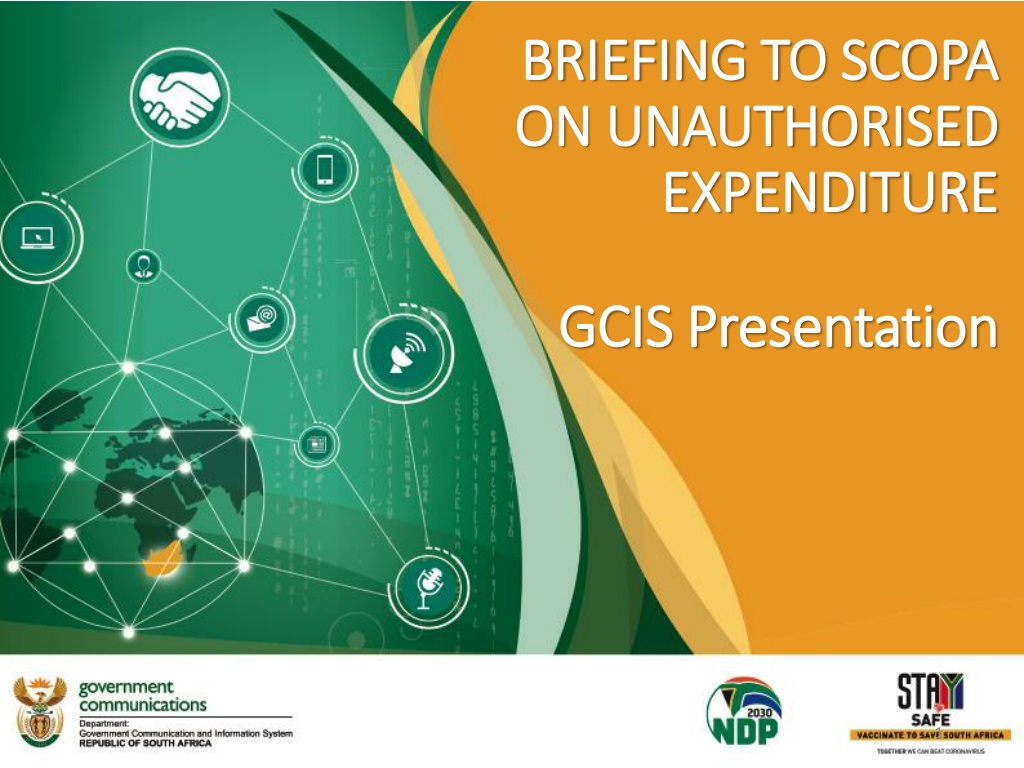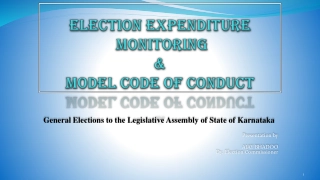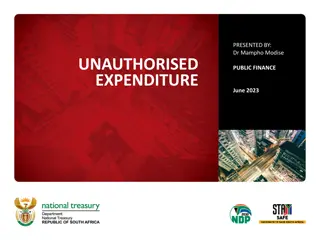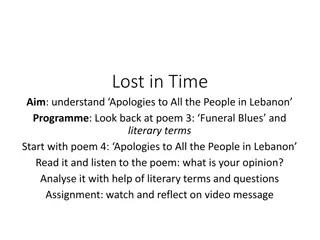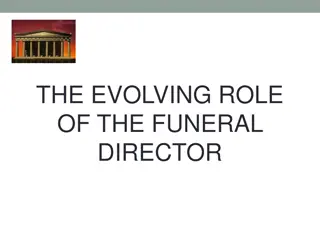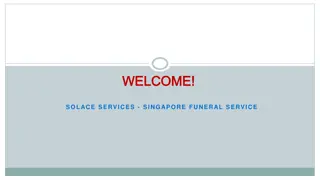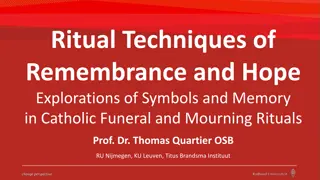GCIS: Addressing Unauthorised Expenditure and State Funeral Mandates
The presentation to the Standing Committee on Public Accounts (SCOPA) highlights the legislative mandate of the Government Communication and Information System (GCIS) in providing timely and accurate information to the public. It delves into the State funeral policy mandates, background on unauthorised expenditure during specific financial years, challenges faced, measures implemented, and recommendations put forward by GCIS. The focus is on transparency, accountability, and effective communication in government operations, with a special mention of the State Funeral for Nelson Mandela.
Download Presentation

Please find below an Image/Link to download the presentation.
The content on the website is provided AS IS for your information and personal use only. It may not be sold, licensed, or shared on other websites without obtaining consent from the author. Download presentation by click this link. If you encounter any issues during the download, it is possible that the publisher has removed the file from their server.
E N D
Presentation Transcript
BRIEFING TO SCOPA BRIEFING TO SCOPA ON UNAUTHORISED ON UNAUTHORISED EXPENDITURE EXPENDITURE GCIS Presentation GCIS Presentation 1
CHIEF GOVERNMENT COMMUNICATOR: PRESIDENT CYRIL RAMAPHOSA The message of hope, of recovery and of rebirth. We shall recover. We shall overcome. May god bless South Africa and protect her people President Cyril Ramaphosa GCIS supports the delivery of government priorities through communication Confidential 2
Presentation outline 1. Legislative mandate 2. State funeral policy mandate 3. Background 4. Current challenges 5. Measures put in place 6. Recommendations 3
1. Legislative mandate 1. Legislative mandate Section 195(g) of the Constitution of Republic of South Africa of 1996 prescribes that the public should be provided with information that is timely, accurate and importantly accessible. Provide strategic leadership and coordinating a government communications system that ensures public is informed in a coherent and consistent manner 4
2. State funeral policy mandate State funeral policy mandate In terms of the policy manual for state, official and provincial funeral, GCIS is mandated to coordinate and manage the following: Joint media operations centre Production of funeral and memorial services programmes, Provision of official photographs and signage for critical areas Media liaison and management Local mobilization 5
3. Background Background GCIS recorded unauthorised expenditure during 2013/14 and 2014/15 financial years in respect of unforeseen and unavoidable events which were not appropriated on the GCIS baseline budget allocations in both financial years. Although the Accounting Officer must take effective and appropriate steps to prevent unauthorised expenditure in terms of section 38(c)(ii) of the Public Finance Management Act (PFMA), please note that the unauthorised expenditure in both financial years were less significant in nature as it was only disclosed in the annual financial statements and not in the Auditor-General Report. The President declared a State Funeral after the death of the first democratic elected President of the Republic of South Africa, Mr Nelson Mandela. GCIS participated in the Funeral Planning Committee, which was the national structure set up to effect implementation of the State Funeral. 6
3. Background: State Funeral Background: State Funeral GCIS was expected to provide communication services and support to The Presidency as outlined in the State Funeral Manual. GCIS was primarily responsible for, amongst others, media liaison services and product development as well as coordination of communication through the government communication system and structures across all spheres. As State Funeral are events of national significance and attract international attention, GCIS had to ensure participation of a wider audience in the country and beyond and help the nation grieve the passing away of the statesman A comprehensive but focused Government Communication Strategy was developed and implemented by GCIS, as the lead communications department in Government 7
3. Background: State Funeral Background: State Funeral GCIS had not budgeted for the State Funeral of President Nelson Mandela As a result, GCIS submitted a request to National Treasury to reimburse GCIS for expenditure incurred in respect of the provisioning of communication services during the State Funeral of Mr Nelson Mandela. However, National Treasury did not allocate additional funds to GCIS to cover the State Funeral. As a result, GCIS had to scale down on all running costs and some communication activities to apply reprioritisation to fund the infrastructure cost, In light of National Treasury not allocating funds for the unforeseen and unavoidable expenditure relating to the State Funeral, GCIS exceeded its voted funds by R3.7 million. 8
3. Background: State Funeral Background: State Funeral The effect unauthorised expenditure on main divisions is as follows: Programme 3: Intergovernmental Coordination and Stakeholder Management R2.3 million Programme 4: Communication Service Agency R1.4 million GCIS ensured that the following were achieved: State Funeral took place in a dignified, coherent and organised manner; Government spoke with one voice and directed the narrative that was formed on the passing and the days following after; Media space was occupied with statements, briefings and messages; of note, there was overwhelming international media presence and interest given the stature of President Mandela world-wide Protection and projection of a positive image and reputation of the country, an efficient government, our rich cultural traditions and a warm, hospitable country 9
3. Background: 2014 NMOS Background: 2014 NMOS Following the restructuring of Cabinet portfolios after the 2014 general elections, GCIS identified that the Department may overspend its budget allocation (prior to the 2014 AENE). This was as a result of the establishment of the Ministry of Communications for which no funds were allocated in the original 2014/15 baseline allocation In light thereof that the 2014/15 original appropriated budget for GCIS did not include funds for the new Ministry of Communications, GCIS submitted a request for additional funds of R45.5 million (R11.8 million for Personnel, R19.8 million for Operations and R13.9 million for Office Accommodation) to the Treasury Committee, through National Treasury s adjustment budget process. Due to budgetary constraints, only R12 million was allocated to GCIS which mostly funded compensation of employees. 10
3. Background: 2014 NMOS Background: 2014 NMOS Additional funds required for operations included the procurement of vehicles for Pretoria and Cape Town for both Minister and Deputy-Minister, upgrade of the security infrastructure, computer equipment as well as subsistence and travelling in addition to the daily operational expenditure. As a result of the projected deficit in the departmental operational budget, reprioritisation had to be applied to fund the aforementioned. These measures included the reduction of Sections training budgets and day-to-day running costs. In addition, expenditure in respect of computer services were shifted from Programme 1 to other programmes in an attempt to avail funds for the Ministry and Deputy-Ministry. Under spending in other Programmes were also shifted to Programme 1 but not all the available funds could be shifted due to the restriction of section 43 of the Public Finance Management Act (PFMA). 11
3. Background: 2014 NMOS Background: 2014 NMOS Following the restructuring of Cabinet portfolios after the 2014 general elections, GCIS identified that the Department may overspend its budget allocation (prior to the 2014 AENE). This was as a result of the establishment of the Ministry of Communications for which no funds were allocated in the original 2014/15 baseline allocation In light thereof that GCIS insufficient funds within Programme 1 baseline allocation, the restriction of 8% utilisation of savings per main division in accordance with section 43 of the PFMA as well as limited funds of R12 million that was allocated by National Treasury for unforeseen and unavoidable expenditure as a result of the Cabinet restructuring, over expenditure of approximately R710 195 was recorded at 31 March 2015 against Programme 1. Notwithstanding the overspending on the main division, GCIS did not overspend its main vote budget for 2014/15 fin year 12
4. Current Challenges Current Challenges The baseline budget allocation of GCIS is constantly under pressure due to budget reductions that were made from GCIS baseline allocations over a period of time, Department of Communication split, National Treasury s measures implemented to manage the wage bill and debt-servicing costs of the state as well as requests that may arise for unforeseen communication tasks. Over the years, GCIS budget growth has been below the CPI, except for 2020/21 financial year. This negative budget growth could potentially lead to significant adverse consequences such as operational compromises, low staff morale, stagnant innovation, and diminished competitive edge 13
4. Current Challenges Current Challenges The Total GCIS budget for 2023/2024 is R750, 746m of which R256,6m is transfers to its entities, leaving GCIS with a budget of R494, 146m to discharge its mandate and operate Head Office, Nine Provincial Offices and District Offices Due to fiscal constraints GCIS has had a negative budget growth over the years which has forced GCIS to cut budgets on its key priorities i.e. number of Vukuzenzele copies printed, employee development and training, communication of apex priorities, procurement of up-todate equipment (ie press rooms, archival) and implementation of key government campaigns With the diverse South African population, diminishing South African reputation internationally, changing technological and communication landscape, GCIS is unable to fund its priorities that will ensure it remains agile to changing environment, let alone fund the unauthorised expenditure reflected above 14
5. Measures put in place Measures put in place In order to attempt to avoid recurrence of unauthorised expenditure, the Department has put measures in place and is continuously monitoring the expenditure trends through the in-year monitoring reports sent to National Treasury, monthly reports to the Minister in the Presidency, financial reports to MANCO as well as reports and discussion at the monthly Budget Committee meetings. Furthermore, the CFO and Budget Office continuously perform costing, monitoring and verification of expenditure and requests from programmes, sub-programmes and responsibility managers in order to curtail any unauthorised expenditure that may arise. Given the fact that the nature and events that led to the unauthorised expenditure were unforeseen and unavoidable, no officials were held responsible for the unauthorised expenditure. 15
6. Recommendations Recommendations In light of the fact that GCIS had no control over unforeseen and unavoidable expenditure arising from the State Funeral and restructuring of Cabinet recommending that the Committee: portfolios, GCIS is notes the events and reasons thereof that led to the unauthorised expenditure; notes GCIS measures put in place to curtail unauthorised expenditure; notes GCIS financial constraints, the negative budget growth and its consequences thereof; approves the unauthorised expenditure to be financed as a direct charge against the National Revenue Fund in terms of section 24(1)(a) of the PFMA, Act 1 of 1999. 16
Thank You 17
